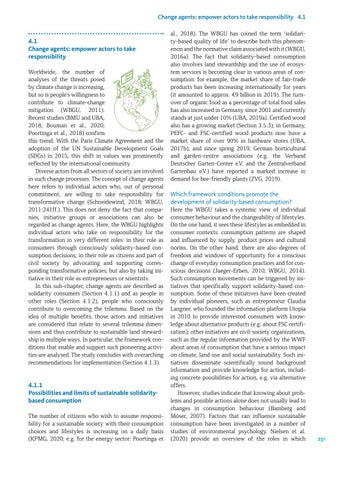Change agents: empower actors to take responsibility 4.1
4.1 Change agents: empower actors to take responsibility Worldwide, the number of analyses of the threats posed by climate change is increasing, but so is people’s willingness to contribute to climate-change mitigation (WBGU, 2011). Recent studies (BMU and UBA, 2018; Bouman et al., 2020; Poortinga et al., 2018) confirm this trend. With the Paris Climate Agreement and the adoption of the UN Sustainable Development Goals (SDGs) in 2015, this shift in values was prominently reflected by the international community. Diverse actors from all sectors of society are involved in such change processes. The concept of change agents here refers to individual actors who, out of personal commitment, are willing to take responsibility for transformative change (Schneidewind, 2018; WBGU, 2011:241ff.). This does not deny the fact that companies, initiative groups or associations can also be regarded as change agents. Here, the WBGU highlights individual actors who take on responsibility for the transformation in very different roles: in their role as consumers through consciously solidarity-based consumption decisions; in their role as citizens and part of civil society by advocating and supporting corresponding transformative policies; but also by taking initiative in their role as entrepreneurs or scientists. In this sub-chapter, change agents are described as solidarity consumers (Section 4.1.1) and as people in other roles (Section 4.1.2), people who consciously contribute to overcoming the trilemma. Based on the idea of multiple benefits, those actors and initiatives are considered that relate to several trilemma dimensions and thus contribute to sustainable land stewardship in multiple ways. In particular, the framework conditions that enable and support such pioneering activities are analysed. The study concludes with overarching recommendations for implementation (Section 4.1.3).
4.1.1 Possibilities and limits of sustainable solidaritybased consumption The number of citizens who wish to assume responsibility for a sustainable society with their consumption choices and lifestyles is increasing on a daily basis (KPMG, 2020; e.g. for the energy sector: Poortinga et
al., 2018). The WBGU has coined the term ‘solidarity-based quality of life’ to describe both this phenomenon and the normative claim associated with it (WBGU, 2016a). The fact that solidarity-based consumption also involves land stewardship and the use of ecosystem services is becoming clear in various areas of consumption: for example, the market share of fair-trade products has been increasing internationally for years (it amounted to approx. €9 billion in 2019). The turn over of organic food as a percentage of total food sales has also increased in Germany since 2001 and currently stands at just under 10% (UBA, 2019a). Certified wood also has a growing market (Section 3.5.3); in Germany, PEFC- and FSC-certified wood products now have a market share of over 90% in hardware stores (UBA, 2017b), and since spring 2019, German horticultural and garden-centre associations (e.g. the Verband Deutscher Garten-Center e.V. and the Zentralverband Gartenbau e.V.) have reported a marked increase in demand for bee-friendly plants (ZVG, 2019).
Which framework conditions promote the development of solidarity-based consumption? Here the WBGU takes a systemic view of individual consumer behaviour and the changeability of lifestyles. On the one hand, it sees these lifestyles as embedded in consumer contexts: consumption patterns are shaped and influenced by supply, product prices and cultural norms. On the other hand, there are also degrees of freedom and windows of opportunity for a conscious change of everyday consumption practices and for conscious decisions (Jaeger-Erben, 2010; WBGU, 2014). Such consumption movements can be triggered by initiatives that specifically support solidarity-based consumption. Some of these initiatives have been created by individual pioneers, such as entrepreneur Claudia Langner, who founded the information platform Utopia in 2010 to provide interested consumers with knowledge about alternative products (e.g. about FSC certification); other initiatives are civil-society organizations, such as the regular information provided by the WWF about areas of consumption that have a serious impact on climate, land use and social sustainability. Such initiatives disseminate scientifically sound background information and provide knowledge for action, including concrete possibilities for action, e.g. via alternative offers. However, studies indicate that knowing about problems and possible actions alone does not usually lead to changes in consumption behaviour (Bamberg and Möser, 2007). Factors that can influence sustainable consumption have been investigated in a number of studies of environmental psychology. Nielsen et al. (2020) provide an overview of the roles in which
231
